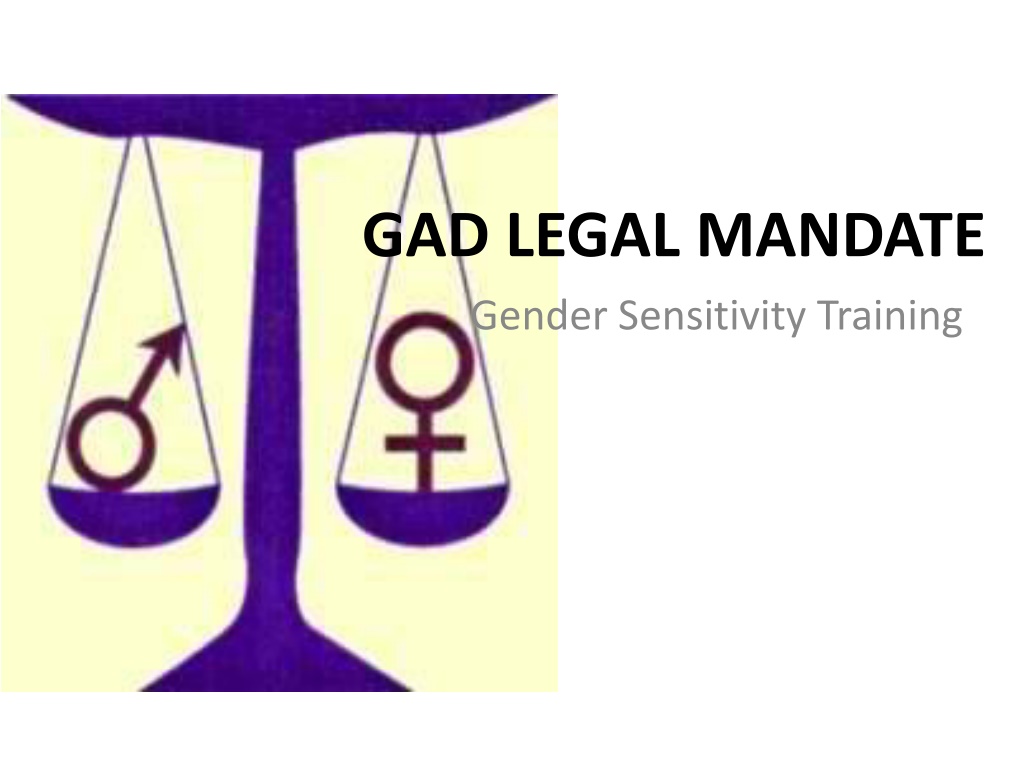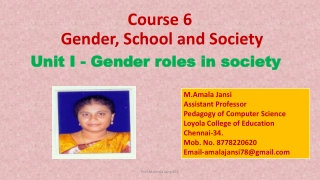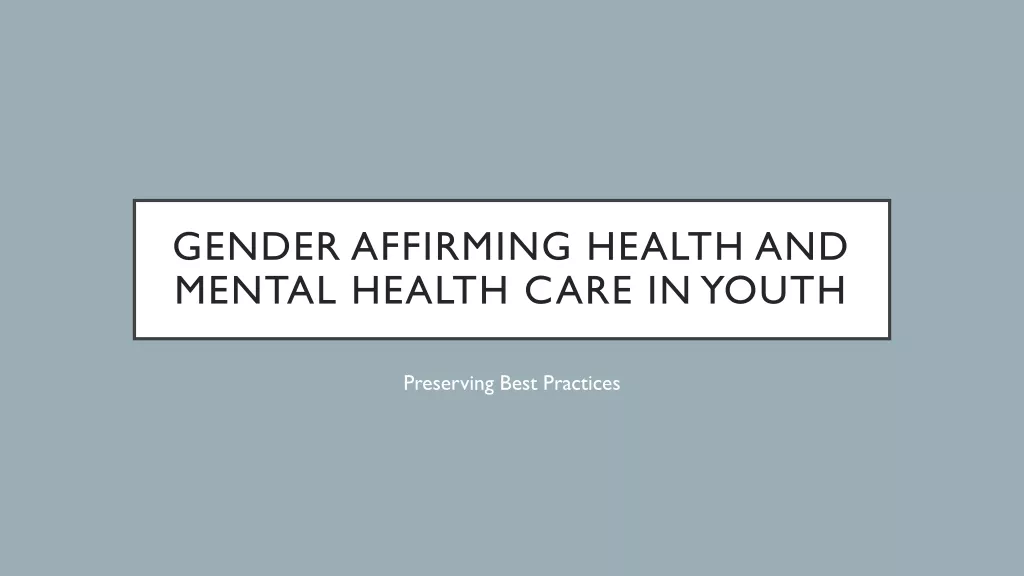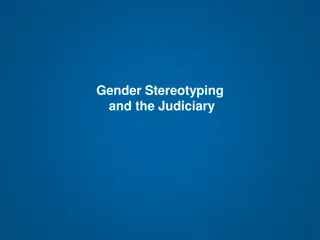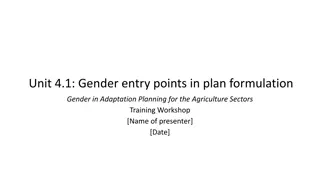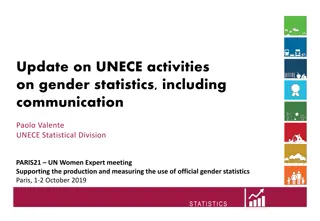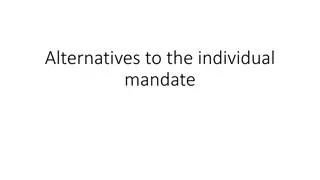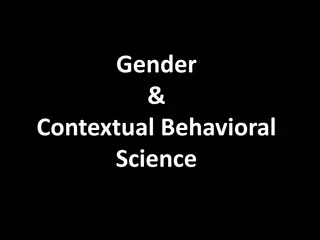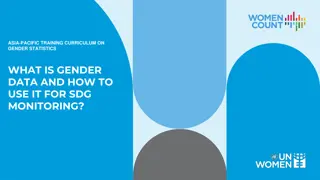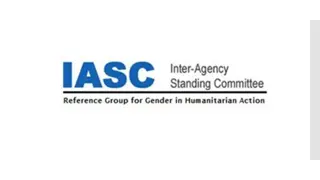Understanding Gender Sensitivity Training in the Legal Mandate
Exploring the socio-cultural and legal frameworks surrounding gender sensitivity training mandated by law, addressing gender bias, aims, legal mandates, laws on GAD, government commissions, and development plans for women. The content delves into the historical context of women's roles, biases, and challenges they face in both the public and private spheres, emphasizing the need to combat gender stereotypes and empower women in all aspects of society.
Download Presentation

Please find below an Image/Link to download the presentation.
The content on the website is provided AS IS for your information and personal use only. It may not be sold, licensed, or shared on other websites without obtaining consent from the author. Download presentation by click this link. If you encounter any issues during the download, it is possible that the publisher has removed the file from their server.
E N D
Presentation Transcript
GAD LEGAL MANDATE Gender Sensitivity Training
Topics 1. Socio-cultural and Legal Framework 2. Gender Bias 3. Aims and Legal Mandates 4. Laws on GAD 5. Government Commissions 6. Development Plan for Women
Socio-Cultural and Legal Framework Biological determinism Women have weaker physique Women are for motherhood Child-bearing Child-rearing Housekeeping This gave rise to working woman s double burden. Hampers their intellectual and career development
Socio-Cultural and Legal Framework Production/Reproduction Dichotomy Women are for the home and men are for the public Those who belong to the public sphere (usually men) are perceived to have primacy in society because of their productive function. Women are relegated to the reproductive function and are perceived to be confined to secondary pursuits. Women are supportive while men take the dominant role.
At home after work DOUBLE BURDEN
Socio-Cultural and Legal Framework Women's contributions have remained both largely invisible to the public eye as well as merely secondary in perceived functions women's active participation in public life has not been as extensive as that of men It is this very subordination that also accounts for the lack of support systems and social benefits for women. The limited access and control that women have over resources, and the comparatively minor roles that women play in the national drama of development.
GENDER BIAS any gender-based distinction, exclusion, or restriction which has the effect or purpose of impairing or nullifying the recognition, enjoyment, or exercise by women, irrespective of their marital status, on a basis of equality of men and women, of human rights and fundamental freedoms in the political, economic, social, cultural, civil or any other field
Education Experience Skills NOT HIRED BECAUSE SHE S FEMALE Education Experience Skills HIRED
Education Experience Skills NOT HIRED BECAUSE SHE S PREGNANT Education Experience Skills HIRED
Gender Bias Marginalization Production/reproduction dichotomy Non-valuation of women s function (family care as mere natural function) Last hired, first fired Gap in salaries Limited access to trainings and promotions Sexual Harassment in the work place simply construed as an occupational hazzard
Gender Bias Subordination In politics and tradition, women do not share the same power, prestige, status, and societal position as men Women are generally given supportive roles. Home, Community, Nation This limits their participation in decision- making and assumption of leadership positions
Gender Bias Stereotyping Family socialization, educational system, career options, portrayal of women in media, teachings of various religious groups women as weak, dependent, subordinate, indecisive, emotional, and submissive. Virgin or vamp Women are trapped and limited by these stereotypes
Gender Bias Multiple Burden House work and child care + work outside the house women work in agriculture, fisheries, manufacturing, service occupations, the informal sector, industry, and the various professions women also participate in socio-cultural and political activities in community affairs, church-related functions, civic activities, and political involvements
Gender Bias Violence Born out of the status of women in the society Verbal and psychological abuse Physical and sexual harassment From the childhood "games" of boys peeping at girls to various acts of lasciviousness, from seduction to abduction, from molestation to wife beating, from prostitution to rape
Gender Bias Personal Society limits a woman s right to be human Reproductive rights and sexuality are constrained Women s health
Aims and Legal Mandates 1. Alter the traditional concept that a woman s self- worth as being subordinate to men. Requirements: Commitment to personal growth, both intellectually and creatively Motivation to take care of one s self Consciousness-raising Sufficient Support Mechanism (e.g. Child care support system) Programs for capacity enhancement Manifestation of attainable goals and role models
Aims and Legal Mandates 2. For Filipinos to recognize and acknowledge childbearing and rearing as vital societal functions Genuine recognition of the value of reproductive sphere Sharing of responsibilities in the family and parenting Family violence Institutional support for women victims of violence
Aims and Legal Mandates 3. Installation of non-sexist education Textbooks and school curricula need to be analyzed and shorn of discriminatory stereotyping, language and career options Rearing of the children will have a great impact 4. Removal of stereotyping in Media 5. Examine discrimination against women in religious tenets and institutions
Aims and Legal Mandates 6. Ensure equal opportunities for both women and men in formal/nonformal education and on-the-job training. Acquisition of non-traditional skills for women Recognizing the childbearing function of women, training programs for women must be set up in order to ease their re-entry into the labor force after the childbearing/rearing period
Aims and Legal Mandates 7. Equal pay for equal work change the patterns of sex discrimination in hiring and promotion 8. Women-friendly technology and infrastructure 9. Greater participation in decision-making, especially with regard to prices of commodities women are largely responsible for consumption in the home
Aims and Legal Mandates 10. ensure the equal rights between women and men. property rights, citizenship rights, safety standards and equal opportunities Legal sanctions must be instituted Legal literacy
Laws on GAD Constitutional Basis Art. II, Sec. 14, 1987 Constitution The State recognizes the role of women in nation-building, and shall ensure the fundamental equality before the law of women and men. Art. XIII, Sec. 14, 1987 Constitution The State shall protect working women by providing safe and healthful working conditions, taking into account their maternal functions, and such facilities and opportunities that will enhance their welfare and enable them to realize their full potential in the service of the nation.
Laws on GAD Constitutional Basis Art. XIII, Sec. 11, 1987 Constitution The State shall adopt an integrated and comprehensive approach to health development which shall endeavor to make essential goods, health and other social services available to all the people at affordable cost. There shall be priority for the needs of the under- privileged, sick, elderly, disabled, women, and children. The State shall endeavor to provide free medical care to paupers. Art. IV, Sec. 1(2), 1987 Constitution Section 1. The following are citizens of the Philippines: [1] Those who are citizens of the Philippines at the time of the adoption of this Constitution; [2] Those whose fathers or mothers are citizens of the Philippines; [3] Those born before January 17, 1973, of Filipino mothers, who elect Philippine citizenship upon reaching the age of majority; and [4] Those who are naturalized in accordance with law.
Laws on GAD Constitutional Basis Article II, 1987 Constitution Right to health Right to a balanced and healthful ecology Right to education Art. III, 1987 Constitution Right to life, liberty and property Right to equality and non-discrimination Freedom of expression Right of Assembly and associations Freedom of movement
Laws on GAD Statutory RA 9710, Magna Carta of Women Rights of Women Inter-sectoral Implementation Mainstreaming as form of implementation It mandates (a) planning, budgeting, monitoring and evaluation for gender and development, (b) the creation and/or strengthening of gender and development focal points, and (c) the generation and maintenance of gender statistics and sex- disaggregated databases to aid in planning, programming and policy formulation. Funding
Problems Is the pregnancy of an unwed student a ground for expulsion? Is the pregnancy of an unwed faculty member a ground for dismissal? Is the adulterous pregnancy of a married faculty member a ground for dismissal?
Laws on GAD Statutory EO 227, The New Family Code of the Philippines RA 7192, the Women in Development and Nation Building Act which promotes the integration of women as full and equal partners of men in development and nation building RA 6725, An Act Strengthening the Prohibition on Discrimination against Women with Respect to Terms and Conditions of Employment, Amending 135 of the Labor Code, as Amended. Joint Circular No. 2012-01 (GAD Plans and Budgets and Accomplishment Report Implementing MCW) RA 7877, Anti-Sexual Harassment Act, which declares sexual harassment unlawful in the employment, education and training environment RA 6949 declares March 8 of every year as a working holiday to be known as National Women's Day
Problem Although they have no impediment to marry each other, X and Y are living together without the benefit of marriage; X, the common law husband, is the only one working; Y, the common law wife, manages the household; During their union, they established a estate amounting to P6M; X broke up with Y because the latter cannot give him a child. In the liquidation and distribution of the estate, how much will go to Y?
Answer P3M, or one half of the estate. Art. 147. When a man and a woman who are capacitated to marry each other, live exclusively with each other as husband and wife without the benefit of marriage or under a void marriage, their wages and salaries shall be owned by them in equal shares and the property acquired by both of them through their work or industry shall be governed by the rules on co-ownership.
Answer In the absence of proof to the contrary, properties acquired while they lived together shall be presumed to have been obtained by their joint efforts, work or industry, and shall be owned by them in equal shares. For purposes of this Article, a party who did not participate in the acquisition by the other party of any property shall be deemed to have contributed jointly in the acquisition thereof if the former's efforts consisted in the care and maintenance of the family and of the household.
Problem I am pregnant and the father of my child is a married man. Can I compel him to financially support our child once he is born? Can I also seek reimbursement from the father for all the expenses that I incurred during the pregnancy once my child is born?
Answer Yes to the financial support. Yes to the reimbursement, if there is a legal demand. Child is illegitimate (Art. 165, Family Code) who is entitled to financial support from the parents. REQUIREMENT: RECOGNITION BY THE FATHER PROOF OF AFFILIATION
Answer PROOF 1) record of birth appearing in the civil register or a final judgment; and 2) an admission of illegitimate filiation in a public document or a private handwritten instrument and signed by the parent concerned.
Answer In the absence of the foregoing evidence, illegitimate filiation shall be proved by: 1) open and continuous possession of the status of a legitimate child; or 2) 2) any other means allowed by the Rules of Court and special laws (Article 172, Family Code of the Philippines).
STEPS UPON BIRTH: ask the father to recognize him as his illegitimate child by accomplishing the Affidavit of Acknowledgment/ Admission of Paternity found at the back of his birth certificate. If your child has been recognized by his father, he shall have the right to receive financial support from him.
STEPS REFUSAL: Seek redress from the court by filing a petition for compulsory recognition and support. NOTE: A recognized illegitimate child shall also have the right to use the surname of his father (Section 1, RA 9255), and the right to inherit from him through succession (Article 887, Civil Code of the Philippines).
Laws on GAD Statutory RA 7877, Anti-Sexual Harassment Act, which declares sexual harassment unlawful in the employment, education and training environment
Problem Mr. X is an employer; A is a hardworking employee; Mr. X opened a position for promotion; A applied but was denied by Mr. X; Mr. X invited A to have a date with him, out of town for three days. Is there sexual harassment?
Laws on GAD (1) In a work-related or employment environment, sexual harassment is committed when: (a) The sexual favor is made as a condition in the hiring or in the employment, re-employment or continued employment of said individual, or in granting said individual favorable compensation, terms of conditions, promotions, or privileges; or the refusal to grant the sexual favor results in limiting, segregating or classifying the employee which in any way would discriminate, deprive or diminish employment opportunities or otherwise adversely affect said employee; (b) The above acts would impair the employee's rights or privileges under existing labor laws; or (c) The above acts would result in an intimidating, hostile, or offensive environment for the employee.
